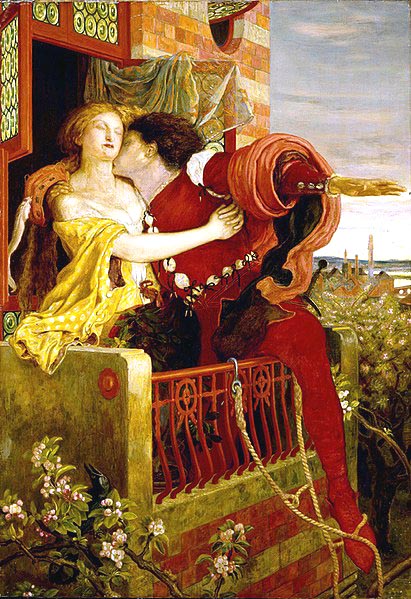 |
| Romeo and Juliet in the famous "balcony scene" (Wikipedia) |
Note: The "stars" of Shakespeare's Romeo and Juliet are often held up as paradigms of romantic love. But are they really good role-models for young lovers to follow?
Get Ready: Should young people follow the wishes of their parents and society when it comes to relationships, or is "being in love" a good enough reason to break the rules?
This "story of woe" about "Juliet and her Romeo" is set in a fictionalized version of Verona, Italy, where two families, the Montagues and the Capulets, have lived as enemies for many years. At the time of the story, brawling has again erupted, with younger members of each household fighting each other in the streets, despite admonitions by Escalus, Prince of Verona. He announces that any further fighting will be punishable by death.
The Prince's relative, Count Paris, speaks to the elder Capulet about marrying his daughter, Juliet. But the old man asks the Count to wait until the girl is a little older--after all, she's only 13--and he invites Paris to attend a ball planned by the Capulets. Juliet's mother and her nurse try to convince the girl that marrying Paris is a good idea.
Meanwhile, Romeo--scion of the Montagues--is depressed because Rosaline, his would-be lover (whom we never see), has jilted him. His cousin Benvolio and his friend Mercutio--another relative of the Prince--convince Romeo to "crash" the Capulets' party by entering without an invitation. There, he sees Juliet and falls in love with her not knowing who she is. Juliet's cousin Tybalt recognizes Romeo by his voice (despite his mask) and wants to fight him then and there, but old Capulet stops him; he does not want bloodshed in his house. Romeo and Juliet meet and flirt. They even dance together, but don't exchange names.
Later that night, after learning Juliet's identity, Romeo sneaks into the Capulets' garden. The girl has learned his name, too, and he overhears her repeating it from her window: "Romeo, Romeo! wherefore art thou Romeo?" ("Wherefore art thou" means "why are you.") She means, "Why did you have to turn out to be Romeo?" She is lamenting that he is a Montague, and the son of her father's enemy. If only he had a different name! He reveals himself to her and they declare their love to each other.
The next day, with the help of the girl's aged nurse, the couple is secretly married by a family friend, Friar Laurence, who is hoping this marriage will bring the two families together.
Shortly after the secret wedding, Juliet's cousin Tybalt challenges Romeo to a duel, but the newly-married Romeo now considers Tybalt to be family and refuses to fight him. However, Romeo's friend (and the Prince's relative) Mercutio takes up the challenge, and Tybalt kills him. In grief, rage, and guilt, Romeo kills Tybalt, for which the Prince banishes him from Verona to Mantua.
In order to keep from being forced by her parents to marry the Count, Juliet--remember, already Romeo's wife--drinks a potion to make it look as though she has died. This is part of a crafty plan by Friar Laurence, who sends a message to Romeo in Mantua. He is to come fetch Juliet and take her back to Mantua with him, where they can live away from their parents' influence. However, a quarantine delays the messenger, so Romeo never receives the word. Unfortunately, Romeo's own servant gets through and tells Romeo of (what he believes to be) Juliet's "death."
Because he thinks Juliet is dead, Romeo rushes back to Verona. Before going to the Capulet crypt, he buys some real poison from an apothecary. Meanwhile, Count Paris has come to Juliet's tomb to mourn. Romeo sees him there; they fight, and Romeo kills Paris. Inside the tomb Romeo finds Juliet's "corpse." Miserable, he drinks the poison near her body. Just as he dies, she awakes to find him there, dead, and stabs herself with his dagger.
The two families, seeing the folly of their ways, agree to end their feud.
--------Read more: https://en.wikipedia.org/wiki/Romeo_and_Juliet
Practice: Match the term to its definition below:
- admonitions
- brawling
- corpse
- crypt
- duel
- erupted
- feud
- folly
- jilted
- would-be
- long-running fight, often between families and frequently violent
- dead body
- warnings
- intended; wished-for
- fight between two people
- broke out
- rejected by a lover
- room for holding the dead
- foolishness
- fighting between crowds
Answers are in the first comment below.
Submitted to the Shenzhen Daily for January 25, 2021


Answers to the Practice: 1. c; 2. j; 3. b; 4. h; 5. e; 6. f; 7. a; 8. i; 9. g; 10. d
ReplyDelete